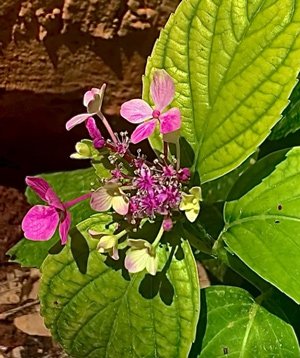There are different types of hydrangeas. Most do not enjoy cold and windy weather. These perennials bloom in spring and summer. So imagine my surprise when this little buddy grew by itself, not very far from the main plant that I have kept when acquiring my property! Hereafter, are some tips to care for your hydrangea.
Hydrangeas can grow to become small trees. They enjoy the morning sun without the heat of the day and afternoon. That is why a lot of people plant them next to the homes or fences.
Beware of watering your hydrangea too much! This is one of the common issues. Although these plants enjoy moist soil, they do not tolerate being waterlogged. So make sure that the soil does not retain too much water and that it remains light for the roots to thrive. Using compost can help in keeping the soil full of nutrients and light. Read what I wrote on how to compost here. Spreading mulch to cover the surface of the roots can also preserve humid grounds. Most of the hydrangea types enjoy water, but not excessively. You can apply fertilizer if you think your soil doesn't contain enough nutrients.
You should note that if your hydrangea stops blooming by mid-summer, it's probably because the weather is too warm for its taste. It might bloom again with cooler temperatures in fall. Not only do hydrangeas grow all alone, but they also don't require pruning. Just remove the dead wood when this occurs.
A fun fact about hydrangea is that you can control the color of some of the types. How do you do that? Simply by changing the pH of the soil. When it's acidic, the plant absorbs more aluminum and this helps the flowers turn blue. Adding sulfur or peat moss can achieve this state. A higher pH is reached when adding ground limestone to the soil. In this case, the flowers will be pink.
Finally, there are several benefits to the hydrangea plant and its roots. Traditionally, hydrangea was used for urinary issues, kidney stones, and bladder trouble. It also can relieve sore muscles. Consult your doctor before using it on your body or ingesting it to avoid any possible adverse reaction.
Happy gardening!

